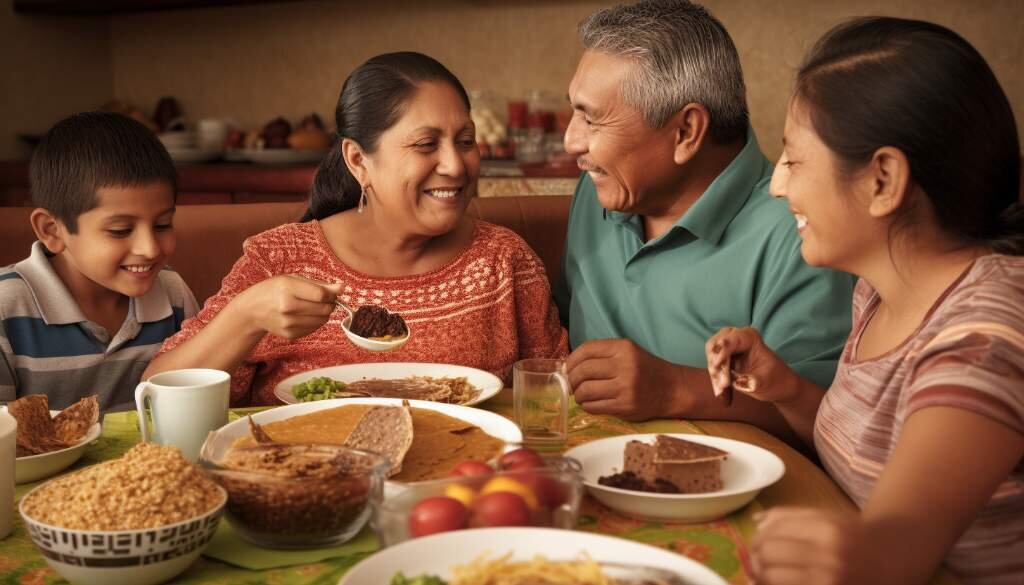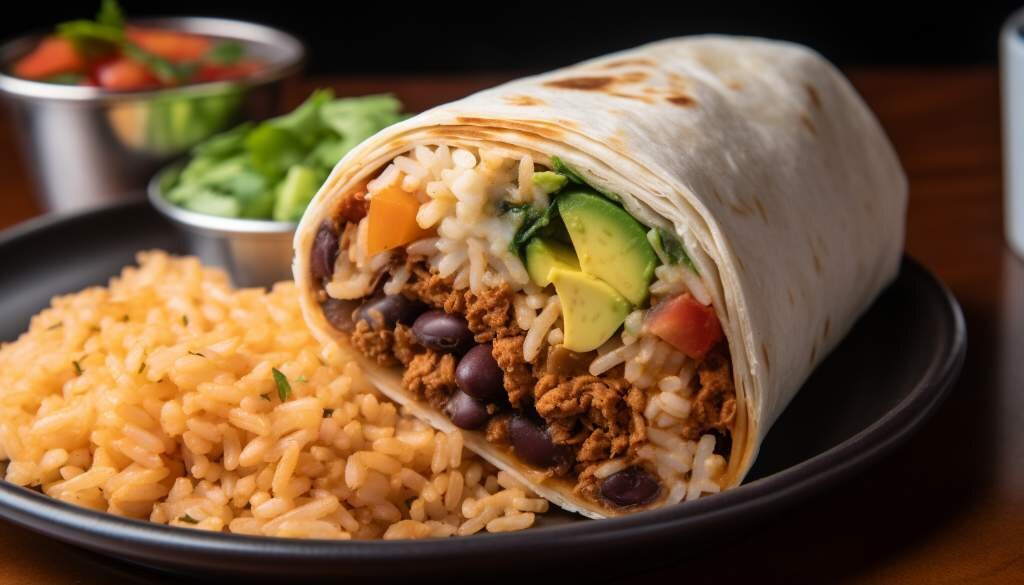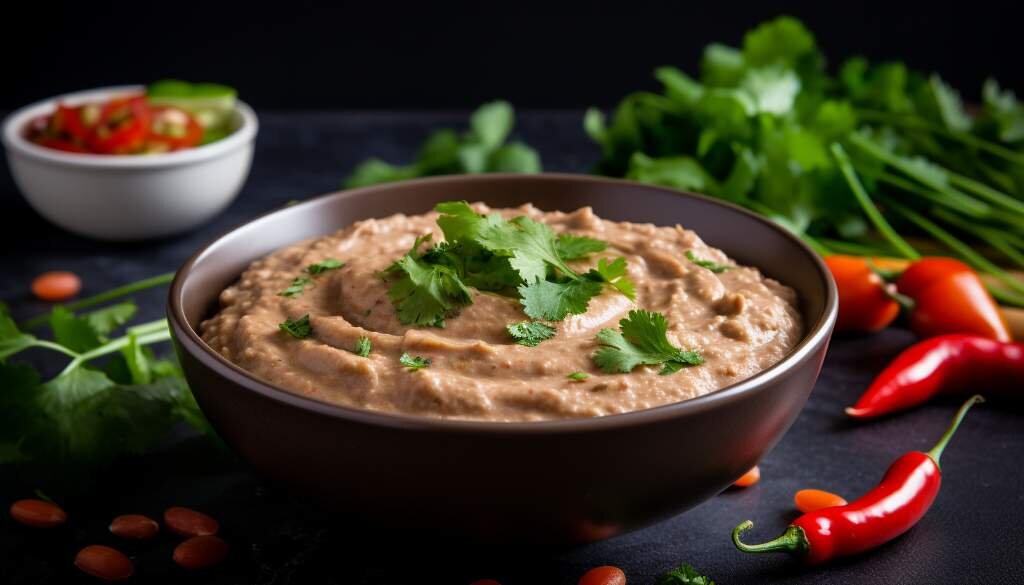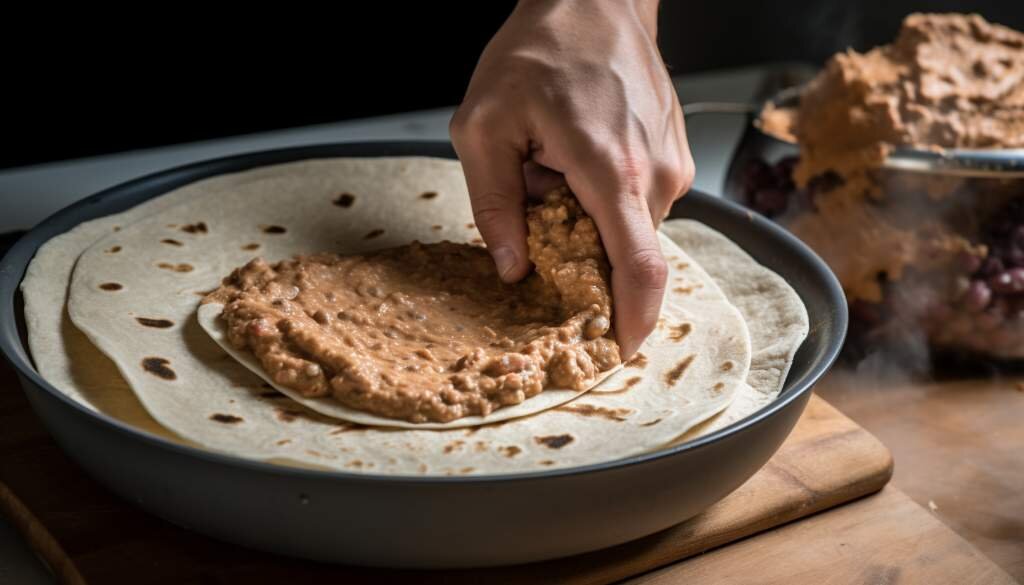
Understanding Refried Beans
Refried beans are a popular staple in Mexican cuisine, often used as a filling in burritos, tacos, and enchiladas. Despite their name, refried beans are not actually fried twice, but rather cooked and mashed to achieve their unique texture.
In the following sub-sections, we will explore the nutrition, health benefits, risks, and various ways to incorporate refried beans into your diet. Let's delve deeper into the world of refried beans.
What are refried beans?
Refried beans are a popular Mexican dish that is made by frying and mashing cooked beans. Despite the name, refried beans are typically only fried once. The name ‘refried' comes from the Spanish term ‘refritos,' which means ‘well-fried' or ‘well-cooked.'
Traditionally, refried beans are made using pinto beans, although other types of beans like black beans can also be used. The beans are cooked until they become soft, and then they are mashed and fried with various seasonings such as onion, garlic, and spices.
Refried beans are a staple in Mexican and Tex-Mex cuisine and are often used as a filling for burritos, tacos, and enchiladas. They can also be enjoyed as a side dish or as a dip with tortilla chips.
Nutrition in refried beans
Refried beans are a nutritious food that provides several key nutrients necessary for a healthy diet. They are made from cooked and mashed beans, typically pinto or black beans, that are then fried or sautéed in oil. While the name ‘refried' may suggest that they are fried twice, they are usually only cooked once in oil.
One of the primary nutritional benefits of refried beans is their high protein content. Protein is essential for building and repairing tissues, supporting the immune system, and producing enzymes and hormones. A 1-cup serving of refried beans contains around 15 grams of protein, which is approximately 30% of the recommended daily intake for most adults.
In addition to protein, refried beans are also a good source of dietary fiber. Fiber is important for maintaining digestive health, promoting feelings of fullness, and regulating blood sugar levels. A serving of refried beans can provide up to 15 grams of fiber, which is about half of the recommended daily intake for adults.
Refried beans are also rich in various vitamins and minerals. They contain significant amounts of folate, iron, magnesium, and potassium. Folate is essential for the production of red blood cells and DNA synthesis, while iron is crucial for oxygen transport in the body. Magnesium plays a role in over 300 enzymatic reactions and potassium is important for maintaining proper heart and muscle function, as well as balancing fluids in the body.

Health Benefits of Refried Beans
Refried beans offer a variety of health benefits that make them a nutritious addition to your diet. Packed with essential nutrients, refried beans can help improve your overall well-being. In this section, we will explore the different health benefits of refried beans.We will start by discussing the fiber and protein content in refried beans, which are crucial for supporting digestive health and providing a steady source of energy. Additionally, we will look at the vitamins and minerals found in refried beans that contribute to various bodily functions and promote better health.Another important aspect that we will delve into is the high levels of sodium and fat found in some refried beans. While they can be a delicious and convenient food option, it is important to be mindful of the negative effects that excessive sodium and fat intake can have on your health.To help you incorporate refried beans into your diet, we will provide easy ways to add them to your meals. Whether you enjoy them as a side dish, a filling for tacos or burritos, or as a dip, we will provide you with creative recipes and serving suggestions.Lastly, we will discuss how to choose healthy refried bean brands. We will highlight what to look for in a brand that offers nutritious options and reduced levels of sodium and fat.Stay tuned as we explore the numerous health benefits, risks, and usage of refried beans, providing you with all the information you need to make informed decisions about incorporating this delicious and versatile legume into your diet.
Fiber and Protein content in refried beans
Refried beans are not only delicious but also a great source of fiber and protein. These nutrients offer various health benefits and make refried beans a nutritious addition to your diet.
Fiber is an essential nutrient that aids in digestion and promotes overall gut health. A serving of refried beans typically contains around 7 to 9 grams of fiber, depending on the brand and preparation method. This can contribute to meeting your recommended daily fiber intake and help prevent constipation.
In addition to fiber, refried beans are also rich in protein. Protein is important for building and repairing tissues, supporting immune function, and maintaining healthy muscles. A serving of refried beans can provide around 8 grams of protein. This makes them a valuable plant-based protein source, especially for those following a vegetarian or vegan diet.
Furthermore, the combination of fiber and protein in refried beans can help promote satiety, keeping you feeling fuller for longer and potentially aiding in weight management.
Vitamins and minerals in refried beans
Refried beans are not only delicious but also packed with various vitamins and minerals that can contribute to your overall health. Here are some of the key nutrients found in refried beans:
- Folate: Refried beans are an excellent source of folate, also known as vitamin B9. Folate plays a crucial role in cell growth and development, making it especially important for pregnant women to ensure they get an adequate intake. Incorporating refried beans into your diet can help meet your folate needs.
- Iron: Refried beans contain a significant amount of iron, an essential mineral that helps transport oxygen throughout the body. Iron is especially important for individuals who follow a vegetarian or vegan diet, as it can be challenging to obtain sufficient iron from plant-based sources alone. Including refried beans in your meals can contribute to meeting your iron requirements.
- Magnesium: Another mineral found in refried beans is magnesium, which plays a vital role in various bodily functions. Magnesium is involved in muscle and nerve function, blood sugar regulation, and blood pressure control. Adding refried beans to your diet can help ensure an adequate intake of this important mineral.
- Potassium: Refried beans are a good source of potassium, a mineral that helps maintain proper heart and muscle function. Potassium also plays a role in regulating blood pressure and fluid balance in the body. Including refried beans in your meals can help increase your potassium intake.
- Vitamin C: While refried beans do not contain high levels of vitamin C, they do provide a small amount. Vitamin C is an antioxidant that helps protect against cell damage and supports the immune system. Combining refried beans with other vitamin C-rich foods, such as tomatoes or peppers, can enhance your overall vitamin C intake.
- Zinc: Refried beans also contain zinc, an essential mineral that supports immune function, wound healing, and DNA synthesis. Zinc deficiency can impair immune function and lead to various health issues. Incorporating refried beans into your diet can help ensure an adequate zinc intake.
Including refried beans in your meals can contribute to your daily nutrient intake, providing you with essential vitamins and minerals that support overall health and well-being. Remember to pair them with a variety of other nutritious foods to maximize the benefits.

Risks and Downsides of Refried Beans
Refried beans are a popular dish made from cooked and mashed beans, usually pinto or black beans, that are fried and seasoned. While refried beans can be a delicious addition to a meal, there are some risks and downsides to consider.
In this section, we will explore the potential risks and downsides of consuming refried beans. We will discuss the high sodium and fat content found in some refried beans, as well as the negative effects they can have on health.
We will also provide information on how to choose healthier refried bean brands that offer reduced sodium and fat options. Additionally, we will discuss the importance of being mindful of portion sizes and how to incorporate refried beans into a balanced diet.
Let's delve into these topics further in the following sub-sections.
High sodium and fat content of some refried beans
Refried beans, a popular staple in Mexican cuisine, can be a delicious addition to your meals. However, it's important to note that some refried bean brands may contain high levels of sodium and fat, which can pose risks to your health if consumed in excess.
Many traditional recipes for refried beans call for the use of lard or large amounts of oil, which can significantly increase the fat content. Additionally, some brands may add extra salt or sodium-based preservatives to enhance the flavor and extend the product's shelf life. These factors contribute to the high sodium and fat content found in some refried beans.
Consuming excessive amounts of sodium can lead to high blood pressure, which increases the risk of heart disease and stroke. Diets high in saturated and trans fats can also contribute to cardiovascular problems.
To mitigate the risks associated with high sodium and fat content, it's crucial to choose healthier options when purchasing refried beans. Look for brands that offer reduced sodium and fat options. These brands often use healthier cooking methods, such as baking or boiling, rather than frying with excessive amounts of oil. Reduced sodium options can help lower your overall sodium intake without compromising the taste of the refried beans.
When incorporating refried beans into your diet, moderation is key. Remember that excessive consumption of any food, even ones with health benefits, can lead to negative effects on your health. It's essential to balance your overall diet and ensure that you are getting a variety of nutrients from other sources as well.
In summary, while some refried bean brands may have high sodium and fat content, there are healthier options available. By choosing reduced sodium and fat brands and consuming refried beans in moderation as part of a balanced diet, you can enjoy this popular dish without compromising your health.
Negative effects on health
While refried beans can be a delicious and nutritious addition to your diet, it's important to be aware of potential negative effects on your health. Here are some considerations to keep in mind:
- Gas and bloating: Some people may experience gas and bloating after consuming refried beans. This is primarily due to the high fiber content present in the beans. To minimize these effects, it's recommended to start with smaller portions and gradually increase your intake to allow your body to adjust.
- Flatulence: Similar to gas and bloating, consuming refried beans can also cause increased flatulence. This is a normal bodily response to the carbohydrates and fiber found in the beans. Chewing food thoroughly and incorporating digestive aids like ginger or fennel into your meals can help alleviate discomfort.
- Phytates and mineral absorption: Refried beans, like other legumes, contain phytates. Phytates can bind to certain minerals such as iron, zinc, and calcium, reducing their absorption. However, soaking and cooking beans can help reduce the phytate content and increase mineral availability.
- Acrylamide formation: Refried beans, especially those that are commercially processed and fried, can contain acrylamide. Acrylamide is a potentially harmful compound that forms during the high-temperature cooking process. It's best to opt for homemade or low-temperature cooking methods to minimize acrylamide exposure.
- High caloric content: Some commercially available refried beans may be high in calories due to added fats, such as lard or oil. These added fats can increase the calorie content significantly. Checking the nutrition label and opting for reduced-fat options or homemade versions can help you choose healthier refried beans.

Incorporating Refried Beans into Your Diet
Incorporating refried beans into your diet is a great way to enjoy their delicious taste and reap the nutritional benefits they offer. Refried beans are a versatile food that can be easily added to various meals. Whether you're looking to increase your fiber and protein intake or add some Mexican flair to your dishes, refried beans are a nutritious and delicious choice.
In this section, we will explore different ways to incorporate refried beans into your diet and provide you with some ideas and recipes to get you started. From simple additions to your favorite tacos or burritos to more creative and unique uses, there are countless ways to enjoy refried beans.
In the upcoming subsections, we will discuss easy ways to add refried beans to your meals and provide you with recipes and serving suggestions. These ideas will help you get creative in the kitchen and find new and exciting ways to enjoy refried beans as part of your regular diet.
So, let's dive in and discover the many ways you can incorporate refried beans into your diet.
Easy ways to add refried beans to your meals
Incorporating refried beans into your meals can be a delicious and nutritious way to add flavor and texture. Whether you're a fan of Mexican cuisine or looking to diversify your meals, here are some easy ways to enjoy refried beans:
- As a side dish: Refried beans make a great accompaniment to many meals. Serve them alongside grilled chicken or fish, add them to tacos or burritos, or enjoy them as a dip with tortilla chips.
- In soups and stews: Refried beans can be a wonderful addition to soups and stews, adding thickness and a rich flavor. Stir them into chili, vegetable soup, or even minestrone for an extra dose of protein and fiber.
- In salads: Add a scoop of refried beans to your salad for a boost of protein and fiber. They pair well with leafy greens, tomatoes, avocado, and salsa. You can also use them as a replacement for dressing or as a base for a Mexican-inspired salad.
- In breakfast dishes: Refried beans can be a tasty addition to breakfast burritos, huevos rancheros, or even scrambled eggs. They add a savory element and make the meal more filling.
These are just a few ideas to get you started, but the possibilities are endless. Feel free to experiment and find your favorite ways to incorporate refried beans into your meals. Enjoy!
Recipes and serving suggestions
Adding refried beans to your diet is a delicious and nutritious way to incorporate more protein, fiber, and essential micronutrients. Here are some mouthwatering recipes and serving suggestions that will help you enjoy refried beans in various ways:
1. Bean Burritos
One of the most popular ways to enjoy refried beans is by making bean burritos. Simply heat up a tortilla, spread a generous amount of refried beans, and top it with your favorite ingredients like shredded lettuce, diced tomatoes, cheese, and salsa. Roll it up, and you have a satisfying and filling meal ready to go.
2. Nachos
Create a delicious plate of loaded nachos by layering tortilla chips with refried beans, melted cheese, jalapenos, and onions. Pop it in the oven until the cheese is melted, and then top it off with your favorite toppings like guacamole, sour cream, and salsa. It's a perfect snack or appetizer for gatherings or movie nights.
3. Enchiladas
Prepare a tasty batch of enchiladas by rolling refried beans in corn tortillas and placing them in a baking dish. Pour your favorite enchilada sauce over the top and sprinkle some cheese. Bake it until the cheese is bubbly and golden brown. Serve it with a side of Spanish rice and enjoy the flavors of Mexico in your own kitchen.
4. Bean Dip
Create a crowd-pleasing bean dip by combining refried beans with your favorite seasonings like garlic, cumin, and chili powder. Heat it on the stovetop or microwave until warm. Serve it with tortilla chips, crackers, or sliced vegetables for a tasty and nutritious appetizer.
5. Quesadillas
Make a quick and easy quesadilla by spreading refried beans on a tortilla and topping it with cheese, chopped vegetables, and even cooked chicken or beef if desired. Fold the tortilla in half and cook it in a skillet until the cheese is melted and the tortilla is crispy. Cut it into wedges and serve it with salsa or sour cream.
These are just a few examples of how you can incorporate refried beans into your meals. Feel free to get creative and experiment with different recipes and serving suggestions to find your favorite way to enjoy this nutritious and versatile ingredient.

Choosing Healthy Refried Bean Brands
Choosing Healthy Refried Bean BrandsChoosing healthy refried bean brands is an important aspect of incorporating them into your diet. When shopping for refried beans, it's crucial to consider various factors to ensure you're making a nutritious choice.In the upcoming sections, we will explore what to look for in a healthy refried bean brand and highlight some brands that offer reduced sodium and fat options. These considerations will help you make an informed decision and select the best refried beans for your health.
What to look for in a healthy refried bean brand
When choosing a healthy refried bean brand, there are a few key factors to consider. Here are some things to look for:
- Ingredient List: Check the ingredient list to ensure that the refried beans contain minimal additives and preservatives. Look for brands that use simple and natural ingredients.
- Low Sodium: Excess sodium can increase the risk of high blood pressure and other health problems. Opt for brands that offer reduced sodium options or choose ones that have lower sodium content compared to others.
- Low Fat: Some refried bean brands can be high in unhealthy fats, which can negatively impact heart health. Look for brands that offer low-fat or fat-free options.
- No Added Sugar: Added sugars can contribute to weight gain and other health issues. Choose brands that don't include added sugars in their refried beans.
- Organic and Non-GMO: If you prefer organic or non-genetically modified (non-GMO) products, look for brands that offer these options. Organic and non-GMO refried beans are made with ingredients grown without synthetic pesticides or genetic modifications.
By considering these factors, you can find a healthy refried bean brand that aligns with your dietary preferences and goals.
Brands offering reduced sodium and fat options
Reduced sodium and fat options are becoming increasingly popular among refried bean brands, catering to the demands of health-conscious consumers. These brands recognize the importance of offering healthier options without compromising on flavor.
- Amy's Kitchen: Amy's Kitchen is a well-known brand that offers a variety of organic and vegetarian refried beans. Their products are free from added preservatives and GMOs, and they also have reduced-sodium options available. Amy's Kitchen uses high-quality ingredients to deliver a delicious and healthy refried bean experience.
- Eden Foods: Eden Foods focuses on providing organic and natural foods, including refried beans. They offer low-sodium options that contain no added fat or oil. Eden Foods uses traditional cooking methods to preserve the flavors and nutrients of their beans, making them a great choice for those looking for healthier alternatives.
- Juanita's Foods: Juanita's Foods is a brand known for its authentic Mexican flavors. They offer refried beans with reduced sodium and fat options. Juanita's Foods prides itself on using traditional recipes that combine taste and nutrition. Their beans are cooked slowly to achieve a rich and creamy texture, making them a popular choice for those seeking healthier options.
- Santa Cruz Organic: Santa Cruz Organic is a brand that specializes in organic food products. They offer refried beans made from organic pinto beans and other natural ingredients. Their low-sodium options provide a healthier alternative to traditional refried beans without compromising taste. Santa Cruz Organic's emphasis on sustainability and quality makes them a trusted brand for health-conscious consumers.
- La Preferida: La Preferida offers an extensive range of Mexican-inspired food products, including refried beans. They have options with reduced sodium and fat content, making them suitable for those with specific dietary needs. La Preferida focuses on delivering authentic flavors using high-quality ingredients, ensuring a satisfying and healthy refried bean experience.
When choosing a refried bean brand, it's important to consider your individual dietary preferences and nutritional goals. These brands provide reduced sodium and fat options, allowing you to enjoy refried beans without sacrificing your health.








